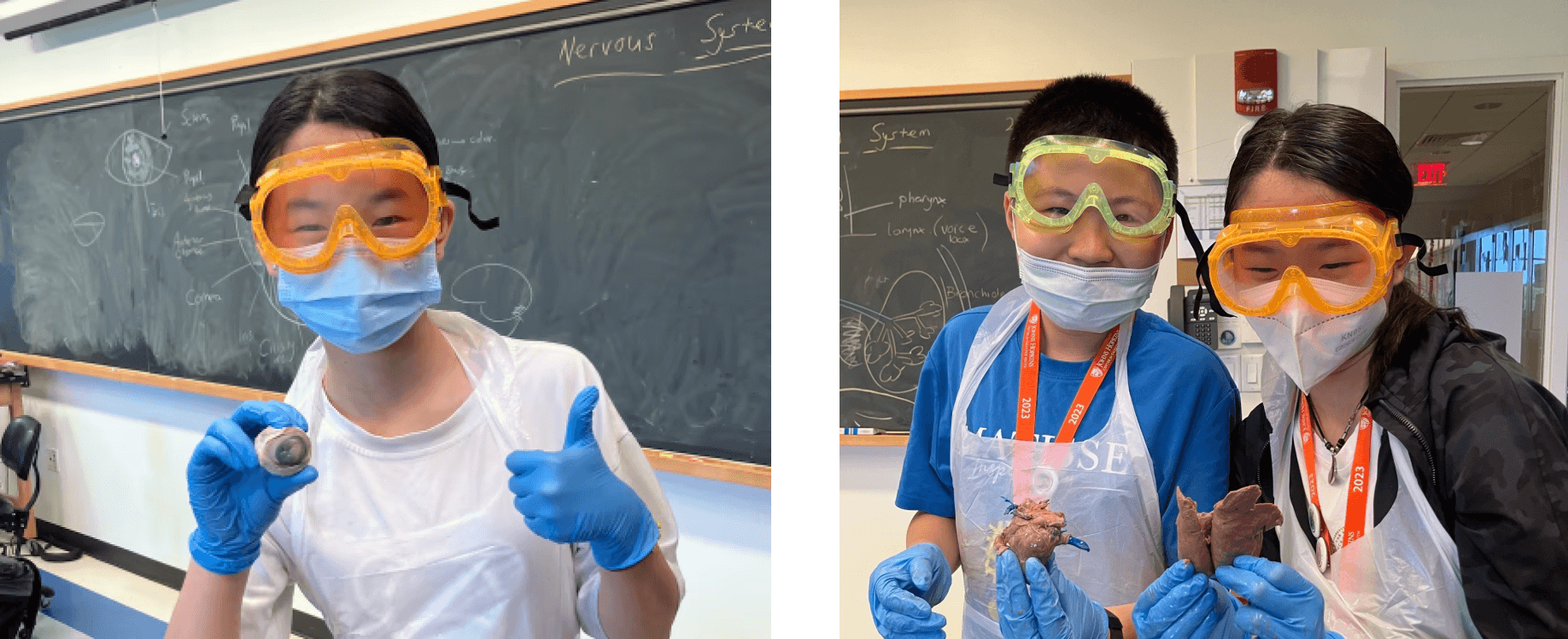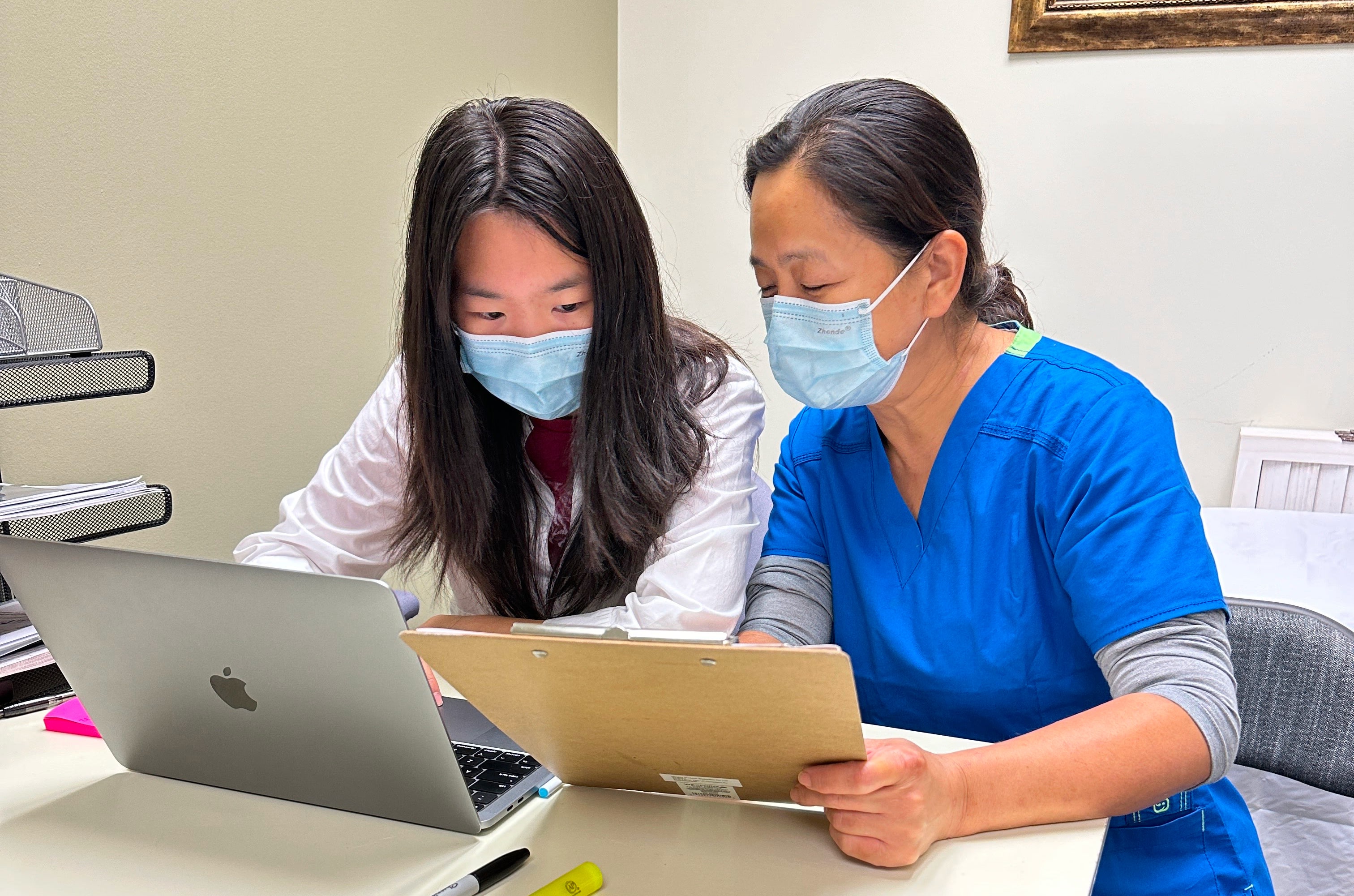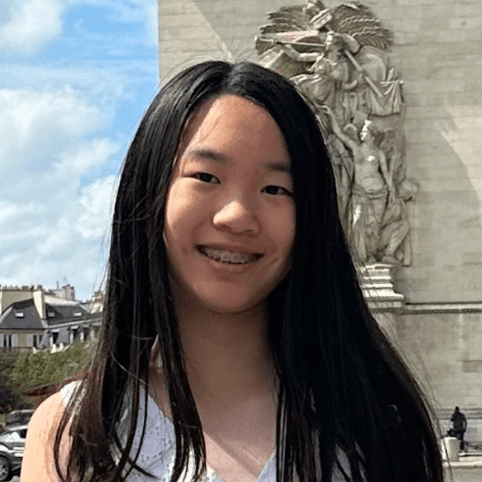Jolee Xian
The fellowship achieved the impossible; making an already STEM-crazed student become even more passionate about every aspect of the field. I was given every tool I could ask for to further fuel my goals in my favorite subject of biology, and even reignited my interest for topics I thought were not for me. I had access to resources that I had never had before, and through the talks, activities, and ideathons we had every week, I felt like everything that I learned was so easily applicable to real life and importantly, well within my reach of experience as a freshman in high school. I also loved the support network, with knowledgeable and hilarious mentors as well as peers that were as passionate as I, supporting me every step of the way. I started the fellowship as merely a curious mind, and finished it with confidence, filled with a burning resolve to pursue my North Star.
Jolee Xian is a high school student with a natural curiosity for understanding how things work, fueled by a wide range of STEM interests. Growing up, she was particularly drawn to biology and mathematics, but her experiences during the fellowship sparked a newfound interest in computer science and computational biology. Jolee has excelled in various science and math olympiads, earning first place nationally in Math Kangaroo and placing in the top 1% in Math Olympiad. She’s also a talented chess player— ranking 25th nationally!
Outside of academics, Jolee is an avid reader and writer who uses creative writing and poetry as creative outlets. Inspired by her experiences in the fellowship, she founded FTiSTEM (Future Trailblazers in STEM) to encourage younger students to explore STEM and ignite their curiosity. Read on to learn more about Jolee’s journey in STEM, her dedication to empowering younger students, and her aspirations in biology and medicine!
Meet Jolee
How did you become interested in STEM, and what subjects are you interested in?
Growing up, I was an incredibly curious kid, always wondering how things worked, which naturally drew me to STEM. I loved figuring things out—it made me so happy. Right now, I’m especially interested in the life sciences because it involves studying living things, which feels so tangible and real to me. I’m also drawn to engineering, so combining these two interests, biomedical engineering seems like the perfect fit. Plus, I love helping people, and biomedical engineering offers the chance to make a real impact in people’s lives, which is a huge bonus.
What extracurriculars do you enjoy participating in?
Academically, I participate in a lot of science and math competitions. I’ve been math team captain for a few years and also participate in math competitions. In 2022, I ranked first nationally in Math Kangaroo and was top 1% of Math Olympiad, which was really exciting! Currently, I’m preparing for the USA Biology Olympiad (USABO). I was actually really excited to do the fellowship this summer to see if I could find tips on how to compete, like study strategies and tips, which I did!

More recently, I enrolled in the Stanford Online High School. I’m currently taking a course on "Mythology of Science and Biology," which has been super fun! We’ve been learning a mix of statistics, biology, and ecology, which I’ve found fascinating. Outside of academics, I also enjoy playing chess and have competed in the national championships!
What do you enjoy doing in your free time?
Oh, I absolutely love reading and writing. Just last night, I spent quite a while on some creative writing, just for the fun of it. I’d definitely call myself a creative writer—I write essays occasionally, but my main focus is on creative writing, especially poetry. It might not be directly related to STEM, but literature and STEM are both amazing in their own ways, and I enjoy exploring both worlds. My poetry is pretty free-form, and I love using metaphors. Honestly, even in my everyday life, I’m practically built like a walking simile!
Summer Experience
What was your favorite part about the fellowship?
I really enjoyed the career panels, where a group of mentors would talk about different fields or pathways in STEM. I found those sessions incredibly eye-opening. They actually changed my perspective on computer science. I used to feel really intimidated by computer science, but now I’m open to trying it out. If you’d asked people who knew me when I was younger, I would have said, “I hate computer science; it’s terrible.” But now, after seeing what’s possible with it, I’m starting to think, “Maybe it’s not that bad after all.” I’m now open to exploring areas outside of biology and am even thinking of combining my interests in biology with computer science!
Did you have a favorite career panel or other talk from the summer?
Are you really gonna make me choose a favorite? I can’t — they were all so good! I really enjoyed the medical school student panels, where mentors talked about what it’s like to apply for and attend medical school, and the challenges. It was a bit of a reality check, showing me what it takes and making me even more determined to do my best. I’m a little biased because I’m really interested in biology and medicine, but honestly, I loved all the panels and talks!
What were some of the lessons or skills you learned over the summer?
I know this might sound a bit cliché, but one of the biggest lessons I learned was not to give up, even when things feel impossible or setbacks arise. Knowing your limits is important, of course, but one failure shouldn’t be a reason to quit. Over the summer, it was incredibly inspiring to hear from successful mentors who shared the challenges and countless rejections they’d faced. I’ve applied to many programs in the past—some I got into, but I was rejected from many more, and each rejection felt like the end of the world. Hearing mentors talk about how behind every success were dozens of rejections, and how they kept pushing forward, was a powerful reality check. It helped me put things in perspective and gave me the motivation to keep going.
Another huge takeaway was learning practical skills like time management and organization. I’m still using some of the techniques I picked up, like using Google Sheets to plan my time. I kept using the time tracking log from the summer, where I track what I do each day, and right now, I’m using three planners at once! It’s helped me stay a lot more organized.
And of course, I can’t forget the cold emails! That topic was emphasized so much over the summer, and it’s been such an impactful skill to learn. I’ve sent several cold emails since the fellowship ended, and I’ve actually gotten some pretty exciting responses!
That’s awesome! Could you share more about what you did after the fellowship, and what happened with the cold emails?
Sure! I’m part of a program called Davidson Young Scholars, where each of us works on a nonprofit project. My organization is focused on breaking the stereotype that math and science are only for “nerdy” people. This idea was actually inspired by the fellowship, since I found it incredibly helpful. I wanted to adapt a similar approach for younger kids to spark their interest in STEM early.
Growing up, I felt intimidated by STEM because of the stereotype that it’s just for “nerdy people.” My project aims to change that perception for younger kids by connecting them with older mentors who share their excitement for science and math in a fun, accessible way. To kick things off, I cold-emailed a bunch of schools to see if they’d be open to sharing their STEM curriculum or letting me observe how they teach STEM to their younger students. I received a few helpful responses, which was really exciting and a great first step in getting the project off the ground!
What advice would you give future participants?
Go to everything! Don’t skip the optional sessions— they’re all so useful. I participated in the fellowship alongside another camp called CTY, and I still made time for everything. I remember one night, there was a really loud dance going on in the background, and I was hiding in a corner trying to listen to Isabella speak, while people were screaming “Viva la Vida” in the background!
Once, I missed an optional session because I had overlapping events at another camp, and I regretted it. Thankfully, I was able to catch up by watching the recording, which made me feel a lot better. Next year, I’m planning to attend the fellowship again, and I’m hopeful it won’t overlap with my camp time like before so I can join everything again!
Also, you should definitely do all the projects and get feedback! The deliverables and ideathons might take some extra time, but they’re worth it. Everyone’s super approachable and friendly, so it’s a great chance to ask questions and get guidance. Doing the projects really helps you build real-life skills too—like the resume workshop. My resume was pretty rough initially, but getting feedback on it was so helpful. I’m also really young still, but it made me think, “Oh, maybe I should start thinking about creating and using a resume.” It doesn’t mean you have to go all out, but it’s good to start keeping these things in mind.
Future Aspirations
What are your career aspirations?
I know I want to go into a career where I’m helping people. It’s something I’ve always enjoyed—even at school, I’d always help my classmates with homework, making sure everyone understood the material. I’d be like, “Wait, you don’t get this? Come here, and I’ll explain it all to you.” It just makes me happy when I can help others feel confident.
I hope to become a doctor one day so I can help as many people as possible. I’m especially interested in biology and cellular technologies, specifically how technology can support health at a molecular level. I find cells fascinating—all those tiny molecules working together to keep us going is just incredible to me.

Over the summer, one of the mentors introduced the idea of “finding your North Star,” and it really resonated with me. During the first week of school, we were asked about our goals, and I actually used the term “North Star,” capitalized and all! It was amazing to see how the fellowship had impacted me and felt meaningful to have that kind of focus and direction after learning about finding my own North Star.
How did the fellowship influence your career aspirations?
Oh, this one's a big one. The fellowship kind of threw me into another “life crisis,” in a good way! I realized I love all areas of STEM—not just biology. I used to think computer science wasn’t for me, but now I’m genuinely interested in it. In fact, I’m even reconsidering physics and thinking of picking up more math. So many things became interesting to me through the fellowship!
Also, the fellowship introduced me to computational biology. It’s the perfect combination of computer science and biology. I also think data science and engineering could be really exciting—using computer science tools to design solutions in biomedical engineering, for example. It’d be amazing to work on both the biology and engineering sides.
What have you been up to since the fellowship? Any new projects you’re excited about?
Yes! I’ve been working on the nonprofit I mentioned earlier, called FTiSTEM—Future Trailblazers in STEM. It’s focused on introducing young kids to the possibilities in STEM, showing them all the different things they can explore at an early age. The fellowship really inspired me to start this, but geared toward a younger audience. In a way, the fellowship laid the foundation for this project. Now, I can tell my students, “If you like what we’re doing here, maybe you can apply to the fellowship when you’re older!”
I’m also working on starting a new club at my school. Although we’re a STEM-focused school, we surprisingly don’t have a biology club, so I’m in the process of applying to create one. There’s a whole application process, but I’m excited to hopefully bring a dedicated space for biology to our school community!
The Summit STEM Fellowship (SSF) is a virtual summer fellowship empowering the next generation of leaders in STEM. With alumni from over 30 countries, the fellowship has formed a vibrant, diverse network of future STEM leaders. To learn more, please visit the Fellowship Overview page. You can also find student spotlights on the Summit STEM Fellowship Newsletter. Subscribe to stay up to date with program announcements and new student spotlights!
Applications for the 2025 Summer Fellowship are now open. To apply, students must fill out a 2025 Summit STEM Fellowship Application. Admissions are rolling, and students are encouraged to apply as early as possible.

